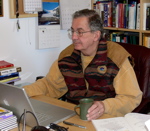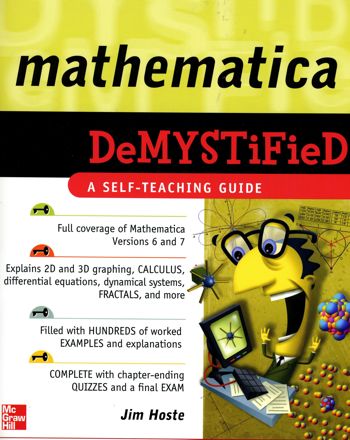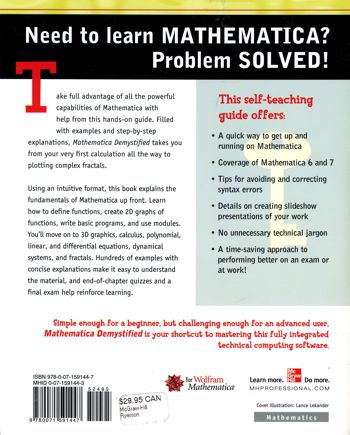
2009 Daley Log
Page 13
I made a commitment yesterday to making mathematics my first early morning activity. I want this to become a regular habit.
I have three threads to my mathematics Learning:
I will treat each session as being approximately 1 hour in length.
I need to find a way of indicating my progress.
Let's try a table:
The Mathematics Survival Kit (2005) by Jack Weiner |
||
| May 8/09 | Factoring: Difference of Square and Cubes | 3 - 6 |
Mathematica Demystified (2009) by Jim Hoste |
||
| May 1/09 | Getting Started | 1 - 9 |
| May 2/09 | Getting Started (formatting notebooks) | 10 - 26 |
Calculus Know-It-All (2009) by Stan Gibilisco |
||
| April 20/09 | Ch. 1 Single-Variable Functions | 3 - 19 |
| April 21/09 | Ch. 1 Single-Variable Functions | 19 |
| May 5/09 | Ch. 2 Limits and Continuity | 20 - 34 |
The Calculus Lifesaver (2007) by Adrian Banner |
||
| April 24/09 | Ch. 1 Functions, Graphs and Lines | 1 - 24 |
| April 25/09 | Ch. 1 Functions; Inverse Functions | 1 - 11 |
| April 26/09 | Ch. 1 Composition of Functions; Odd & Even Functions; Graphs; Common Functions | 11 - 24 |
| April 29/09 | Ch. 2 Review of Trigonometry | 25 - 38 |
| April 30/09 | Ch. 2 Trig Identities | 39 - 40 |
Fascinating. It has taken me an hour to review what I have been doing so far. But this review is essential. Let's try a few words.
The fundamental underlying idea is that of a function. A function is a rule for mapping one set of elements to another set of elements. There are many types of functions: algebraic, trigonometric, logarithmic, exponential. Functions can also be described by their properties: odd, even, continuous, discrete. One can also combine functions similar to the way we combine numbers. There is also the idea of composition of functions and the idea of an inverse function. The Banner book provides the most detail for this topic.
The idea of a continuous function is closely related to the idea of a limit.
Another critical pre-requisite for working with calculus is being proficient with complex algebraic operations. I have just begun this review by relearning how to factor the difference between two squares or two cubes. But there is much more here that needs review. Weiner is my reference for this.
I also am beginning to relearn the basic use of the software package Mathematica which I hope to use to graph complex expressions. Hoste is proving useful here.
Finally, Gibilisco the book that actually moves me forward on calculus.
What should I tackle this morning? The choice is between Weiner and Hoste. They are both pre-calculus activities.
I think I will opt for Hoste and a session of Mathematica. I want to be able to use this software to explore the ideas that I encounter in the other books.
The first chapter is called "Getting Started". |
It was worthwhile to actually go through the exercises as it reinforced a number of notational conventions. Total time this morning: about 2 hours. |
Tags: mathematics, mathematica
Books on the Go Today |
|
 |
see below
 |